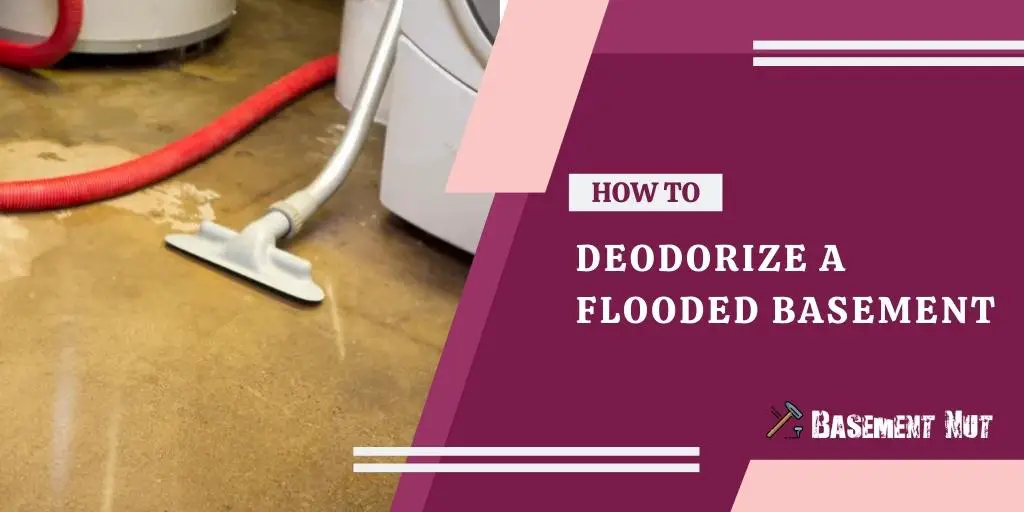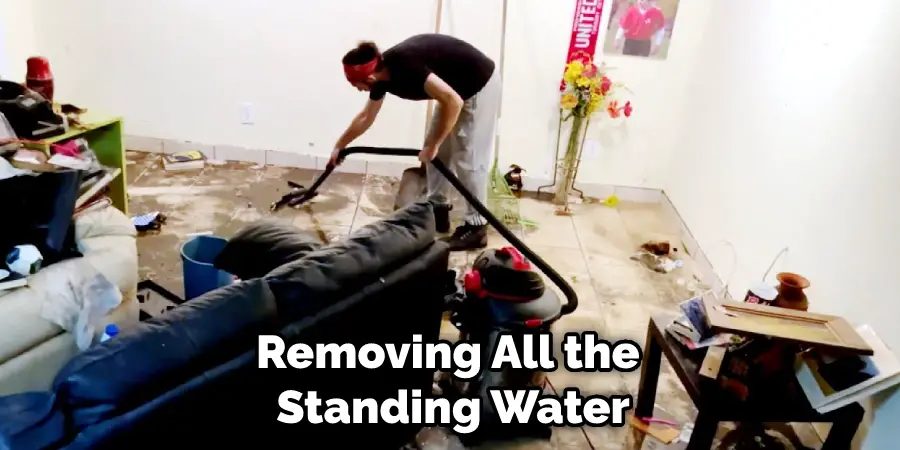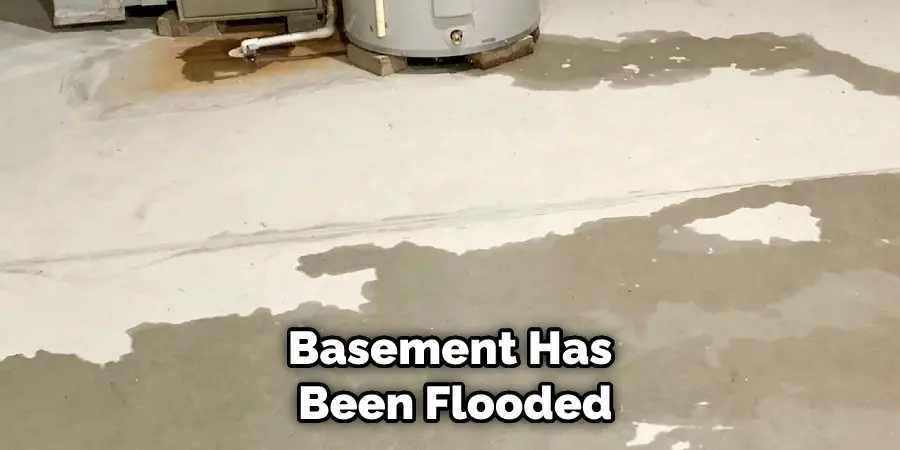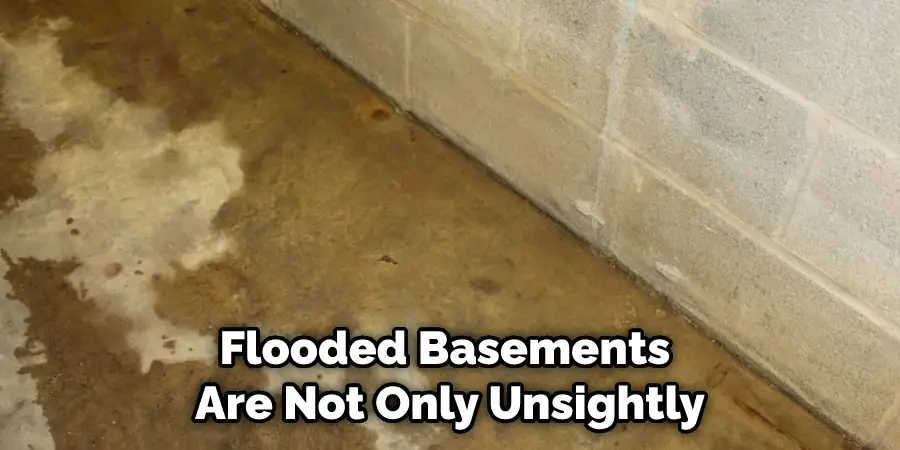A flooded basement can be a homeowner’s worst nightmare. Not only is the water unsightly and creates an unhealthy environment, but it can also cause extensive damage to your property.
If you have had the unfortunate experience of a flooded basement, don’t worry – there are some things you can do to help deodorize and disinfect the space. In this blog post, we will discuss some tips for how to deodorize a flooded basement.
We’ll also discuss some preventive measure you can take to minimize the damage in the future. So keep reading until the end of this blog post!

What Is a Flooded Basement?
A basement can become flooded for a variety of reasons. One common cause is heavy rains that overwhelm the capacity of gutters and downspouts to channel water away from the foundation.
A faulty sump pump can also cause a basement to flood, as can a broken pipe or sewage backup. Regardless of the cause, a flooded basement can pose a serious health risk, as standing water provides a breeding ground for mold and bacteria.
In addition, flooding can damage personal belongings and structural elements such as drywall and flooring. As a result, it is important to take steps to prevent basement flooding, such as installing a sump pump and ensuring that gutters are in good repair. If a flood does occur, it is important to call a professional to assess the damage and begin the cleanup process.
Why Should You Deodorize a Flooded Basement?
After a major storm or flood, one of the first things you want to do is assess the damage to your home. If your basement has been flooded, it’s important to take care of the problem as soon as possible.
Not only can standing water damage your belongings, but it can also lead to mold and mildew growth. And, if the water is contaminated, it can pose a serious health risk.
One of the most important steps in cleaning up a flooded basement is deodorizing the area. This will help prevent mold and mildew growth and make the space more livable until you can get the repairs done.
In addition, there are several ways to deodorize a flooded basement, so ask your local hardware store for advice. With a little effort, you can get your basement back to normal in no time.
8 Tips to Follow on How to Deodorize a Flooded Basement
Basements are prone to flooding from heavy rain or a faulty sump pump. If your basement has been flooded, you need to act fast to remove the water and start the drying process.
But once the water is gone, you’re left with another problem: the musty smell of dampness. To get rid of that odor, you need to deodorize your basement. Here’s how:
1. Remove All Standing Water
The first step in deodorizing a flooded basement is removing all the standing water. This can be done with a wet/dry vacuum or by mopping up the water with towels. Once all of the water has been removed, it is important to dry the area as quickly as possible to prevent mold and mildew from growing.

2. Wash All Surfaces with Soap and Water
Once all of the standing water has been removed, you will need to wash all surfaces with soap and water. This includes walls, floors, and any other surfaces that may have come into contact with the floodwater. Be sure to use a disinfectant soap to kill any bacteria that may be present.
3. Remove Any Wet Carpets or Rugs
If there are any wet carpets or rugs in the basement, they will need to be removed and disposed of properly. Wet carpeting can harbor mold and mildew, so getting rid of it as soon as possible is best.
You Can Also Check It Out to Cover Basement Ceiling With Fabric
4. Use Fans and Dehumidifiers to Dry the Area
Once all surfaces have been cleaned and dried, you will need to use fans and dehumidifiers to help dry the area completely. Run the fans for 24 hours straight, and make sure to empty the dehumidifiers often.
5. Clean Any Clothes or Linens That May Have Been Affected
If any clothes or linens were in the basement during the flood, they would need to be washed in hot water with a disinfectant laundry detergent. It is important to make sure that these items are completely dry before storing them again.
6. Store Any Food in Airtight Containers
Any food that was stored in the basement during the flood will need to be thrown away. Any food that was not affected by the floodwater should be stored in airtight containers to prevent it from becoming contaminated.

7. Call a Professional if Mold or Mildew is Present
If you see any mold or mildew growing in the basement, it is important to call a professional immediately. Mold and mildew can cause serious health problems, so it is best to leave removal and cleanup to the experts.
8. Prevent Future Flooding
Once your basement has been cleaned and deodorized, it is important to take steps to prevent future flooding. This may include installing a sump pump, repairing any leaks, or waterproofing the basement walls. Taking these precautions will help to keep your basement dry and smelling fresh.
That’s it! You’ve now learned how to deodorize a flooded basement. By following these tips, you can get rid of that musty smell and make your basement habitable again.
What You Need to Know About Mold and Mildew?
Mold and mildew are two of the most common household pests. Although they are often found in damp, dark places, they can also grow in dry, dusty areas. In addition to being unsightly, mold and mildew can cause health problems, such as respiratory infections and skin rashes.
To get rid of mold and mildew, it is important to clean affected areas thoroughly and eliminate the source of moisture.
However, mold and mildew can be difficult to remove completely, so it is also important to take preventive measures, such as repairing leaks and ventilating damp areas. By taking these steps, you can help to keep your home mold- and mildew-free.
How to Clean up A Flooded Basement?
If your basement has been flooded, it is important to take action immediately to remove the water and prevent further damage. First, turn off the power to your basement and any appliances that may have been affected by the flood.
Then, remove the water from your basement using a sump pump or wet vac. Once most of the water has been removed, you can start cleaning up any remaining debris.
Be sure to dispose of any spoiled food or hazardous materials safely. Next, use fans and air purifiers to help dry out the area and prevent mold growth.
Finally, call a professional if you need help with major repairs or if you suspect that your home has been structurally damaged. By taking quick and decisive action, you can minimize the damage caused by a basement flood.

How to Prevent a Flooded Basement?
The thought of a basement flooding is enough to make any homeowner cringe. The mess is difficult to clean up, but the water can also cause serious damage to your furnace, water heater, and other important appliances.
Fortunately, you can take a few simple steps to help prevent a flooded basement. For starters, make sure your gutters and downspouts are free of debris.
This will ensure that rainwater can flow freely away from your home. In addition, consider installing a sump pump to help remove water from your basement in the event of a flood.
And finally, be sure to seal any cracks in your foundation to help keep water out. By taking these precautions, you can help keep your basement dry and avoid the headache of a flooded basement.
The Dangers of Black Water in A Flooded Basement
Flooding is a major problem during rainy seasons. Water entering your basement can bring dangerous contaminants, including sewage, chemical waste, and other hazardous materials.
This contaminated water is often referred to as “black water,” and it can pose a serious health risk if you’re exposed to it. Floodwater can also damage your property, causing mold and mildew to grow and potentially leading to structural damage.
That’s why it’s so important to take steps to prevent flooding in your basement and call a professional if you experience flooding. Taking these precautions will help you keep your family safe and your property in good condition.
What Are Some Natural Ways to Deodorize a Flooded Basement?
Flooded basements are not only unsightly, but they can also create an unpleasant odor. However, if your basement has flooded, there are some natural ways you can deodorize the space.
First, open all the windows and doors to allow fresh air to circulate. You may also want to set up some fans to help move the air around. Second, bring in some potted plants. Plants can help to purify the air and absorb odors.
Third, sprinkle baking soda on any areas that have a strong smell. Baking soda is a natural absorbent and will help to neutralize odors. Finally, leave a bowl of white vinegar out in the room. Vinegar is also an effective odor neutralizer.
By following these simple tips, you can quickly and naturally eliminate any unpleasant smells in your flooded basement.

Conclusion
If your basement has flooded, you need to take quick action to remove the water and dry out the area. Once the water is gone, you’ll be left with a musty smell that can be difficult to eliminate.
However, by following these steps (opening up windows and doors, setting up fans, and using a dehumidifier) you can eliminate that odor and have your basement smelling fresh again in no time.
Thanks for reading our post about how to deodorize a flooded basement.
You Can Chack It Out to Fix Bowing Basement Walls
